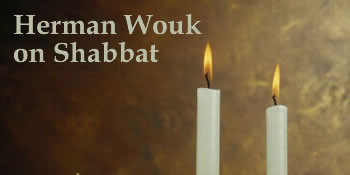
The Shabbat has cut most sharply athwart my own life when one of my plays has been in rehearsal or in tryout.
The crisis atmosphere of an attempt at Broadway is a legend of our time, and a true one; I have felt under less pressure going into battle at sea. Friday afternoon, during these rehearsals, inevitably seems to come when the project is tottering on the edge of ruin. I have sometimes felt guilty of treason, holding to the Shabbat in such a desperate situation. But then, experience has taught me that a theater enterprise almost always is in such a case. Sometimes it does totter to ruin, and sometimes it totters to great prosperity, but tottering is its normal gait, and cries of anguish are its normal tone of voice.
So I have reluctantly taken leave of my colleagues on Friday afternoon, and rejoined them on Saturday night. The play has never collapsed in the meantime. When I return I find it tottering as before, and the anguished cries as normally despairing as ever. My plays have encountered in the end both success and failure, but I cannot honestly ascribe either result to my observing the Shabbat.
Leaving the gloomy theater, the littered coffee cups, the jumbled scarred-up scripts, the haggard actors, the knuckle-gnawing producer, the clattering typewriter, and the dense, tobacco smoke has been a startling change, very like a brief return from the wars.
My wife and my boys, whose existence I have almost forgotten in the anxious shoring up of the tottering ruin, are waiting for me, dressed in holiday clothes, and looking to me marvelously attractive. We have sat down to a splendid dinner, at a table graced with flowers and the old Shabbat symbols: the burning candles, the twisted challah loaves, the stuffed fish, and my grandfather's silver goblet brimming with wine. I have blessed my boys with the ancient blessings; we have sung the pleasantly syncopated Shabbat table hymns.
The talk has little to do with tottering ruins. My wife and I have caught up with our week's conversation. The boys, knowing that Shabbat is the occasion for asking questions, have asked them. We talk of Judaism. For me it is a retreat into restorative magic.
Shabbat has passed much in the same manner. The boys are at home in the synagogue, and they like it. They like even more the assured presence of their parents. In the weekday press of schooling, household chores, and work -- and especially in play producing time -- it often happens that they see little of us. On Shabbat we are always there and they know it. They know too that I am not working and that my wife is at her ease. It is their day.
It is my day, too. The telephone is silent. I can think, read, study, walk or do nothing. It is an oasis of quiet. My producer one Saturday night said to me, "I don't envy you your religion, but I envy you your Shabbat."
From This Is My G-d

